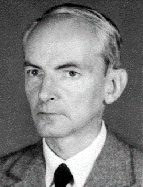

Always uniting philosophy to the history of science, Hooykaas went on to develop a sophisticated empiricism. This was evident in his Gifford Lectures, in which he affirmed the historical continuity of the scientific way of thinking. In these lectures he identified three fundamental components: "fact", "faith" and "fiction", the "proportions" of which are not set a priori . Scientific facts are not raw facts—there is a dialectic of mutual adaptation between the data obtained through experimentation and the expected laws, and the role of the creative imagination that creates hypotheses is remarkable, assuming the suspension of judgement plays an important role (fictions). "Faith" refers to the set of basic beliefs in 'things that are not seen", many of which have a metaphysical or a priori /methodological character. These beliefs, which are also a practical necessity for scientists, lead them, for example, to persist in the idea that a group of phenomena obeys a law—João de Castro, with his experiments on magnetic declination, invalidated any possible relationship of proportionality between that and the difference in longitude in relation to a reference meridian but maintained the conviction that a law existed and should be discovered (Fact, Faith and Fiction…, 1999, pp. 7-13, 188-190). The relationship between this sophisticated empiricism and historical studies is clear in the chapter of this book entitled "Thinking with the hands". This part of the book shows that it was above all from the 17th century onwards in the countries of northwestern Europe that experimental research developed, linked to a cooperation between craftsmen, engineers, and scholars.
Four years after his first visit to Portugal, Hooykaas learnt Portuguese and wrote his seminal text, "The Portuguese Discoveries and the Rise of Modern Science' (1966). It presents the core of his vision of the evolution and innovative nature of the knowledge associated with Portuguese Discoveries, the conflicts of mentality associated with its reception in Portugal, and its international diffusion. This text was part of the whole of his work, which was very focused on the general conditions of the emergence of modern science. Using Portuguese studies on the period (Joaquim Bensaúde, Joaquim de Carvalho, the Cortesão brothers, Pereira da Silva, Fontoura da Costa, Hernâni Cidade, etc.), he launched a general interpretation of the cosmopolitan significance of this knowledge—which these authors were unable to provide because they ignored the detail of the international literature that allowed Portugal to be placed in the general European movement that led to modern science. The author himself summarised it: "Portuguese sailors and scientists of the 15th and 16th centuries made an important contribution to the emergence of modern science, unwittingly undermining belief in scientific authorities and reinforcing confidence in an empirical and natural-historical method" ("The Portuguese Discoveries…", 1966/1983, pp. XV, 580).
This work is financed by national funds through FCT - Foundation for Science and Technology, I.P, in the scope of the projects UIDB/04311/2020 and UIDP/04311/2020.
